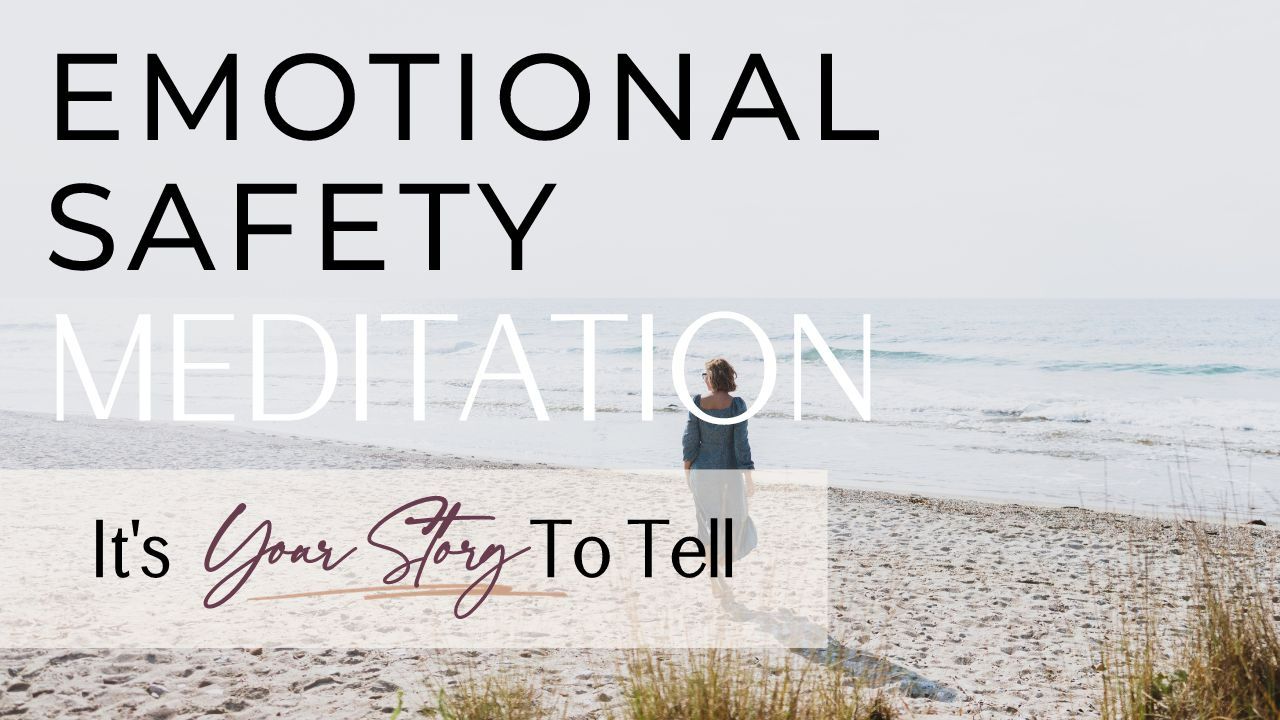Unlocking Deeper Connection: The Power of Emotional Safety in Your Relationship
Oct 09, 2023
We all yearn for meaningful connections, don't we? Perhaps you're in a relationship, and you find yourself craving more, aching for a deeper bond, yet unsure where to begin. Well, here's the secret: before you can embark on that journey to greater connectedness, you need to lay the crucial foundation of emotional safety. It's the cornerstone upon which trust, vulnerability, and authentic intimacy are built. Without emotional safety, any relationship is like a house of cards, fragile and prone to collapse. Join us as we delve into the transformative world of emotional safety and discover how it paves the way for nurturing the profound connections, we all desire.
Mondays are for Mindfulness!
Mindful meditation's profound benefits extend beyond personal growth, as they can pave the way for a stronger connection with oneself, ultimately enhancing our capacity to connect with others. By embracing mindfulness, we foster a deep and authentic understanding of our inner world, which, in turn, enables us to relate to our own thoughts, emotions, and experiences with greater empathy and compassion. This newfound self-awareness forms the foundation for more genuine and meaningful connections with those around us. As we become more attuned to our own needs and emotions, we develop the ability to empathize and resonate with the experiences of others, forging deeper, more fulfilling relationships. In essence, the journey of self-discovery through mindfulness meditation becomes a powerful catalyst for building stronger, more connected bonds with the people in our lives.
🎧 Listen Now to Today's Guided Mindful Meditation: Mindful Healing: Cultivating Emotional Safety and Connection with Self and Others

Unpacking Emotional Safety: Your Gateway to Deeper Connection
Emotional safety is the heartbeat of a thriving relationship. Without it, anxiety can seep in, leading to resentment, emotional exhaustion, and a gradual unraveling of the connection. To cultivate emotional safety, you must first understand the specific needs that underlie it. These needs often stem from childhood experiences and unmet emotional wounds:
1. Acceptance: If your upbringing was marked by constant anger, criticism, or unpredictability, you might have learned to be anxious around strong emotions. You may have developed coping mechanisms, such as trying to appease others or withdrawing to protect yourself. In adulthood, feeling accepted for who you truly are, without the constant need to please or defend, is essential for emotional safety.
2. Feeling Heard: Childhood experiences of feeling invisible, unheard, or unimportant can shape your adult yearning for validation. Whether your parents were preoccupied with their own concerns or neglectful, you may have internalized the belief that your voice and needs didn't matter. In the context of emotional safety, it translates into feeling heard, valued, and respected rather than dismissed.
3. Dependability: Growing up with caregivers who were unreliable due to mental health issues, addictions, or other challenges may have instilled a fear of depending on others. You might have developed a self-sufficient stance to avoid potential disappointment. Emotional safety, in adulthood, involves having dependable people in your life and trusting that you can lean on them without fearing a fall.
4. Working as a Team: In contrast, some individuals grew up in families where independence was emphasized, leading to feelings of isolation and loneliness. Emotional safety now might manifest as a desire for shared responsibilities, a sense of connection, and collaborative teamwork in your intimate relationships.
5. Having Someone Take Charge: Chaotic family environments, where no one seemed to be in control, can create a longing for a strong partner who can confidently handle challenging situations. Safety, in this context, is derived from reliability, collaboration, and the assurance that someone has your back.
Understanding these core emotional needs is pivotal for creating emotional safety in your relationship. Here are seven practical steps to help you build and maintain emotional safety:
1. Respect Boundaries and Consent: Establish and honor personal boundaries in your relationship. Boundaries, whether physical, emotional, or psychological, safeguard both you and your partner.
2. Pay Attention to Nonverbal Communication: Nonverbal cues, such as body language and tone of voice, are potent communicators of emotions. Being mindful of your nonverbal signals helps prevent misunderstandings.
3. Be an Active Listener: Active listening involves being fully present, setting aside distractions, maintaining eye contact, asking clarifying questions, and summarizing what your partner says. It shows that you value their perspective.
4. Practice Transparency: Openness about your thoughts, feelings, and activities builds trust and eliminates suspicions. It's a cornerstone of emotional safety.
5. Give the Benefit of the Doubt: Instead of immediately jumping to conclusions or judgments, approach your partner with curiosity about their motivations and emotions. A compassionate stance fosters open communication.
6. Foster Accountability and Follow Through: Consistently keeping promises and commitments demonstrates reliability and commitment to the relationship, strengthening trust.
7. Consider Couples or Relationship Therapy: Seeking professional guidance can be instrumental in building emotional safety. Therapy helps couples understand their dynamics, improves conflict resolution skills, and lays a foundation for a healthier relationship.

Nurturing Connection: Going Beyond Emotional Safety
Creating emotional safety is just the beginning of nurturing a thriving relationship. Connection, in its many facets, is the life force that sustains and deepens the bond between partners. Let's explore additional strategies for nurturing and maintaining strong connections, especially in a world where social dynamics have evolved:
1. Consider Your Attachment Patterns: Reflecting on your attachment patterns from childhood provides valuable insights into your adult relationships. Understanding your attachment style helps you build more secure and fulfilling connections.
2. Notice Your Inner Critic: Be aware of your inner critic, which may push you toward isolation and self-limiting behavior. Challenge negative thoughts and focus on actions that promote connection.
3. Be Generous with Yourself: Overcoming your inner critic involves being generous with your time and attention. Reach out to friends and loved ones, ask questions, and show genuine interest in others. These actions benefit not only them but also your own sense of connection.
4. Give Connections the Time and Attention They Need: Prioritize spending quality time with loved ones, even in a world filled with distractions. Being fully present in your interactions nurtures deeper and more meaningful bonds.
5. Repair Ruptures: Conflicts and miscommunications are inevitable in any relationship. Learn to repair ruptures by owning your behavior, being open and direct, acknowledging what happened, and validating the other person's experience. This fosters understanding and connection.
6. Take Chances on New Activities: Even in uncertain times, staying open to new experiences and activities can enrich your life. Exploring new interests or volunteering can lead to meaningful connections with like-minded individuals.
7. Make Things Happen: Don't shy away from being the one who initiates connection. Proactively create opportunities for bonding with friends and loved ones, and approach it with enthusiasm rather than obligation.
Connection is a precious and enriching aspect of life, and our goal is to support you in developing a deeper connection to self and others. By recognizing and addressing your emotional needs, actively working to create emotional safety, and embracing opportunities for connection, you can build and maintain stronger and more fulfilling relationships. Stay curious, open-minded, and engaged with others to nurture the bonds that bring joy and fulfillment to your life. With emotional safety as your foundation, you're ready to embark on a journey toward the deeper, more connected relationship you desire.
View The Entire Collection
See all our blog posts to discover valuable insights and tools for navigating trauma and healing with guidance and support.












